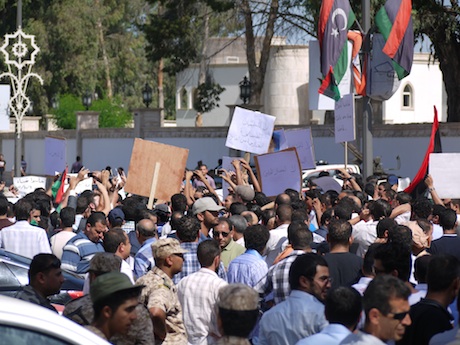By George Grant.

Tripoli, 7 October:
At least 300 demonstrators gathered outside the National Congress today calling on the government to raise the . . .[restrict]siege on the former Qaddafi stronghold of Bani Walid.
The protest came at a moment of acute political as well as military crisis in Libya, with Congress members debating whether to dismiss Prime Minister-elect Mustafa Abushagur at the same moment as protesters gathered at its gates.
Chants of “we won’t give up on Bani Walid” could be heard as demonstrators clapped, waved independence flags and held placards with slogans such as ‘no, no siege’, and ‘Bani Walid calls for a free world’.
The town is presently surrounded by thousands of soldiers from brigades across Libya, with an attack possible in the next few days.
Protesters complained that the town was being strangled of food, fuel and medical supplies as the result of a blockade orchestrated not by the government but by Misrata.
“We are not against the government or the 17 February Revolution”, said Bashir Suleiman, an engineer originally from Bani Walid but now living in Tripoli. “The problem is with Misrata. They are the ones doing the bombing, not the government. Misratans think they are the police of Libya”.
Suleiman, along with several other demonstrators, alleged that Misratan forces had launched airstrikes on the south side of the town this morning, injuring three women and an elderly man.
However, the Libya Herald has been informed that whilst government jets had conducted sorties over Bani Walid this morning there had been no airstrikes and no casualties.
Asked why they would not hand over those suspected of involvement in the torture and death of Omran Shaban, protesters said they did not believe they would be afforded a fair trial.
“Hand them over to who?” asked one. “A gang – to be put in a heater or hanged from a tree? We will hand over our people once the government establishes a proper court.”
Others complained that whilst Bani Walid was being threatened with invasion for not surrendering Shaban’s killers, several hundred prisoners from Bani Walid were still being held in Misrata without trial.
“This is about more than just three or four men who have been kidnapped in Bani Walid”, said Sahed Mohammed, a civil engineer. “We have as many as 500 people in Misrata and nobody is talking about that. We need a solution on both sides”.
Tensions between the two towns, which fought on opposite sides of the revolution, have been stretched to breaking point in the wake of Shaban’s death in a French hospital on 25 September. He was captured there with a colleague in July and held for two months before his release on 13 September following mediation efforts led by National Congress President Mohamed Magarief.
One group of protesters could be overheard chanting “the valley of the 50 tribes will destroy Misrata in one night”.
Negotiations between representatives from Bani Walid and the authorities in Tripoli are ongoing ahead of an extended deadline of 10 October, imposed by Congress, for the town to hand over Shaban’s killers or face the threat of force.
The initial deadline had been 5 October, but was extended after Magarief submitted a request to Congress to push the date back.
Today, Magarief held a closed-doors meeting in Congress with Bani Walid representatives led by Salem Al-Ahmar Ali, who until recently was one of the town’s two representatives in Congress. He was suspended following an investigation by the Integrity Commission on 2 October.
Several delegations have been dispatched to Bani Walid in recent days, with members variously including Magarief, other selected members of Congress, military staff, and respected elders.
To date, these efforts have failed to resolve the crisis and the military remains stationed at four camps on the roads out of Bani Walid.
Should an attack be ordered on the town, there are fears of large-scale civilian casualties and the possibility of retaliatory strikes elsewhere in Libya. In spite of this, however, many both inside Congress and on the street believe that Bani Walid cannot be allowed to continue its defiance of the new government and must be brought into line, even if that means using force to do so. [/restrict]







